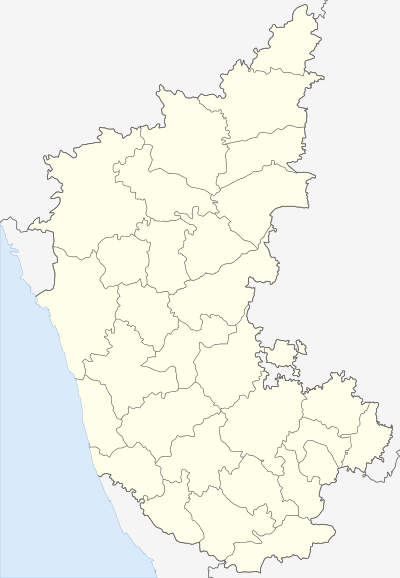Kalasa
| Kalasa ಕಳಸ Kalasha | |
|---|---|
| town | |
|
Spiden Gasteracantha hasselti found in Kalasa | |
 Kalasa Location in Karnataka, India | |
| Coordinates: 13°14′02″N 75°21′19″E / 13.2340°N 75.3553°ECoordinates: 13°14′02″N 75°21′19″E / 13.2340°N 75.3553°E | |
| Country |
|
| State | Karnataka |
| District | Chikkamagaluru |
| Languages | |
| • Official | Kannada |
| Time zone | IST (UTC+5:30) |
| PIN | 577 124 |
| Telephone code | 08263 |
| Vehicle registration | KA-18 |
Kalasa is a holy temple-town located in Chikkamagaluru district in Karnataka. Kalasa is home to the Kalaseshwara Temple dedicated to Lord Shiva. Kalasa lies 92 Kilometres South-west of Chickmagalur and is located on the banks of the Bhadra River.
Origins and Etymology
The origins of Kalasa are traceable to Mythology. Although unsubstantiated, local myths attribute the origin of Kalasa to an event mentioned found in the Skanda Purana.
Accordingly, the wedding of Lord Shiva and Parvathi in Himalayas caused a shift in the Earth's rotation because of the attendance of all Gods and Goddesses. To restore the Earth's balance, Lord Shiva requested Sage Agasthya to travel South. Agasthya however, expressed his wish to witness the wedding. Lord Shiva assured to grant divine vision to the sage, which would enable him to witness the wedding from any part of the world.
Agasthya travelled southward and resided in Kalasa from where he watched the wedding. Local legends state that a pilgrimage to Kalasa brings greater religious merit (punya) than a visit to Varanasi.
The Girija Kalyana (marriage of Lord Shiva and Parvathi) is celebrated in Kalasa every year to commemorate this tradition. This auspicious occasion falls on Karthika Shuddha Ekadashi of Lunar calendar.
Other legends also state that Sage Vasishta had lived in a hermitage near Kalasa as also the Skanda Dwaya.
Etymology
The word Kalasa is a corruption of the Sanskrit root, Kalasha, which means a waterpot or jug. In the context of Hindu temple architecture, every temple should have a round pinnacle placed at the top, known as the Kalasha.
Geographically, Kalasa is surrounded by the Bhadra river on three sides with the Duggappana Katte hill at the South. Viewed from an altitude, the town resembles a pot, hence the name. The Kalaseshwara temple is located at the base of this hill.
Characteristics
Kalasa is chiefly a temple town, and a tourist spot. It is considered a place of pilgrimage by most visitors who arrive in Kalasa to offer their prayers in the Kalaseshwara, and other temples. A typical trip includes visiting Sringeri, Kalasa, and Horanadu, all in the same day.
Kalasa largely has an agricultural economy and heavily depends on the Bhadra river to meet its water needs. Chief produces include a variety of spices, Coffee, and Ayurvedic medicine. Situated in the heart of the Western Ghats, Kalasa enjoys a pleasant climate throughout the year although summers are slightly hot.
Tourist Places
The nearest airport is Mangalore International Airport formerly known as Bajpe airport at Mangalore which 110 Kilometere away from Kalasa.[1] Although Kalasa is pilgrimage spot, it abounds in several tourist attractions such as water spots and of late, private resorts.
Temples
The Kalaseshwara temple is the chief temple of the town. It is currently managed by the Government of Karnataka. Kalasa is notable for these temples:
- Kalaseshwara Temple
- Girijamba Temple
- Hanuman Temple
- Venkataramana Temple
- Ranjal Mahalakshmi Temple
- Vasishta Ashrama
- Shree Chandranatha Swamy Temple
Pancha Theerthas
Kalasa contains five major water spots, within an approximate distance of 8 Kilometres from the town. Together, these are known as Pancha Theerthas (literally, Five Sacred Waters). Each Theertha is associated with a myth drawn mostly from the Hindu Mythology. People offer worship at these Theerthas as part of their pilgrimage to Kalasa.
- Vasishta Theertha--Named after Sage Vasishta
- Naga Theertha--Named in honour of the Snake God, attributable to Lord Shiva.it is believed bathing here will remove Nagashapa/Nagadosha.
- Koti Theertha--To signify koti Devatha stayed here during first Girja Kalyana celebrated to please Aghsthya.
- Rudra Theertha--Named after Lord Rudra (Shiva)is also called Rudrapada., similar to Vishnupada of Gaya it is believed that offering Pinda during pithru Karya is as auspious to Gaya Shradda
- Amba Theertha-- Named after Goddess Parvati.
- Duggapan Katte-- Peak at which the whole kalasa town can be seen.
Festivals
Each year, Kalasa celebrates several festivals to mark different events. The date for each festival is decided early in the year based on the Hindu Calendar. A typical practice during each festival is to take out the Utsava Murthy (Procession Idol) of a temple in a procession throughout the town and bring it back to the temple.
Kalasa celebrates these festivals every year:
- Girija Kalyana--To celebrate the wedding of Lord Shiva and Parvathi. It starts amavasya to harihara hunnime. Kalayana mahotsava is performed by three family who came with agastya muni from kasi. The names of three family are hoskere,mavinakere and kunikere.
- Kalasa Car Festival--The annual car festival or the Rathotsava where the Utsava Murthy (Procession Idol) taken in a procession throughout the town.
- Venkataramana Swamy Temple Car Festival--This is similar to the car festival, where the Procession Idol of Venkataramana Swamy is taken out.
References
Image gallery
 Front View of the Temple
Front View of the Temple Entrance to the Temple
Entrance to the Temple Door carvings at the Temple
Door carvings at the Temple Kalaseshwara Main Temple
Kalaseshwara Main Temple Rear View of the Temple
Rear View of the Temple Horanadu Temple
Horanadu Temple
External links
| Wikimedia Commons has media related to Kalasa. |
